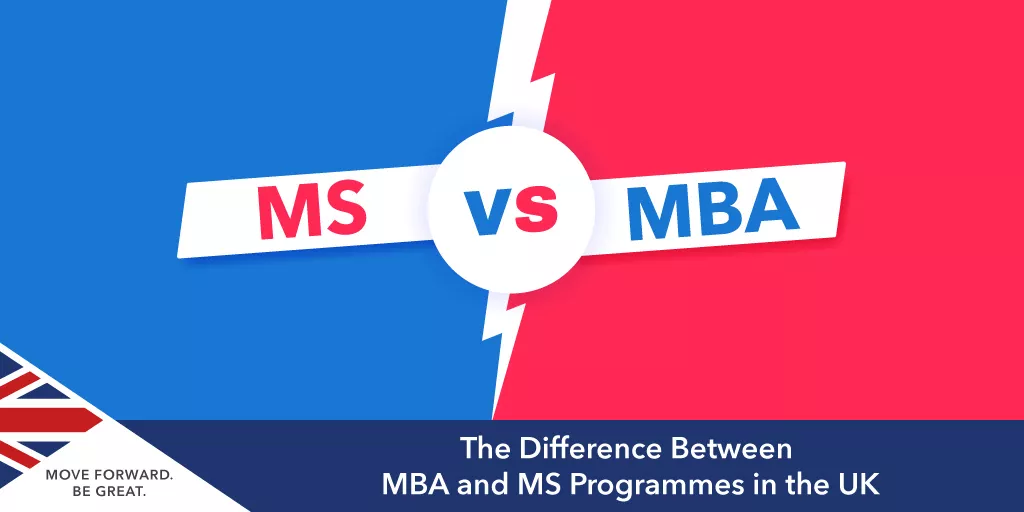When it comes to pursuing higher education, two popular options among students are obtaining a Master of Business Administration (MBA) or a Master of Science (MS). Both degrees offer valuable knowledge and skills, they cater to different career goals and areas of expertise.
Below we explore the differences between an MBA vs MS degree, including their definitions, benefits, typical syllabus, job prospects, and top universities in the UK for each programme. You can also book a free consultation to learn more.

MBA vs MS
What is an MBA?
An MBA, or Master of Business Administration, is a postgraduate degree that focuses on developing business and management skills. It is designed to equip students with a broad understanding of various aspects of business, including finance, marketing, human resources, operations, and strategy. An MBA in the UK typically provides a comprehensive and holistic approach to business education, emphasising leadership, problem-solving, and decision-making skills.
MBA Specialisations
Specialisations in MBA programmes allow students to tailor their education to specific areas of interest. Some common MBA specialisations include:
-
Finance: Focuses on financial management, investment analysis, and corporate finance.
-
Marketing: Emphasises consumer behaviour, branding, market research, and digital marketing strategies.
-
Human Resources: Concentrates on talent management, organisational behaviour, employee relations, and strategic HR planning.
-
Operations Management: Covers topics such as supply chain management, logistics, and process optimisation.
-
Entrepreneurship: Focuses on developing skills to start and manage a new business venture.
-
International Business: Explores global markets, cross-cultural management, and international trade.
-
Strategy: Concentrates on strategic management, business development, and competitive analysis.
-
Healthcare Management: Specific to the healthcare industry, covering healthcare policies, operations, and marketing.
MBA Scholarships
Scholarships for MBA programmes are available to support students financially and recognize academic excellence. The eligibility criteria, application process, and scholarship amounts vary, so it's recommended to research the specific scholarships available at the universities you are considering. Some of the most common scholarships available in the UK for an MBA are:
-
Imperial Excellence Scholarship
-
Indian MBA Scholarship by the University of Birmingham
-
The Full Time MBA Scholarship by Brunel University
-
Regional India Scholarship by Cranfield School of Management
Benefits of Studying for an MBA in the UK
Studying for an MBA in the UK offers several advantages. Firstly, the UK has a rich business environment with numerous multinational companies and renowned institutions, providing ample networking and internship opportunities.
Additionally, UK universities often have strong ties with industry partners, enabling students to gain real-world insights and practical experience. Moreover, an MBA from a reputable UK institution can enhance employability and career advancement prospects, as UK degrees are globally recognized and respected.
Typical MBA Syllabus
The MBA curriculum emphasises strategic thinking, decision-making, and problem-solving, enabling graduates to navigate complex business challenges and drive organisational growth. Additionally, the extensive network built during an MBA program can provide opportunities for career advancement and entrepreneurship. Common subjects covered in an MBA include:
- Accounting and Financial Management
- Marketing Management
- Operations Management
- Human Resource Management
- Strategic Management
- Business Ethics and Corporate Social Responsibility
- Entrepreneurship and Innovation
- Leadership and Organisational Behaviour
- Business Analytics
- Managerial Economics
MBA Salary and Job Prospects
An MBA can lead to a wide range of career opportunities and typically offers competitive salaries. The specific salary and job prospects vary based on factors such as industry, specialisation, work experience, and location. MBA graduates often find employment in roles such as:
- Management Consultant
- Financial Manager
- Marketing Manager
- Operations Manager
- Business Development Manager
- Project Manager
- Entrepreneur
- Investment Banker
- Supply Chain Manager
- Strategy Analyst
Top UK Universities for MBA
- London Business School
- University of Cambridge: Judge Business School
- University of Oxford: Saïd Business School
- Imperial College Business School
- Warwick Business School
- Alliance Manchester Business School
- Warwick Business School, University of Warwick
- Bayes Business School
- Durham University Business School
- Cranfield Business School
What is an MS degree?
An MS course, or Master of Science, degree is a postgraduate degree that provides specialised knowledge and expertise in a specific field of study within the realms of science, technology, engineering, or mathematics (STEM). It focuses on advanced theoretical concepts, practical skills, and research methodologies.
MS courses offer a wide range of specialisations, enabling students to deepen their understanding and expertise in specific areas. Some common MS specialisations include:
-
Computer Science: Focuses on algorithms, software development, artificial intelligence, and computer systems.
-
Data Science: Concentrates on statistical analysis, machine learning, data visualisation, and big data management.
-
Electrical Engineering: Covers areas such as electronic circuits, power systems, telecommunications, and signal processing.
-
Biotechnology: Explores topics like genetic engineering, bioinformatics, pharmaceuticals, and biomedical research.
-
Environmental Science: Focuses on environmental sustainability, conservation, pollution control, and ecosystem management.
-
Civil Engineering: Concentrates on areas such as structural engineering, transportation systems, and urban planning.
-
Psychology: Covers areas such as cognitive psychology, social psychology, behavioural neuroscience, and counselling.
-
Finance: Emphasises financial analysis, investment management, risk assessment, and financial modelling.
MS Scholarships
-
Clarendon Fund by the University of Oxford
-
Oxford-Indira Gandhi Graduate Scholarships
-
Gates Cambridge Scholarship
-
UCL Global Masters Scholarships
-
WMG Excellence Scholarships
Benefits of Studying MS in the UK
Pursuing an MS degree in the UK comes with several advantages. The UK is renowned for its world-class research institutions and offers a conducive environment for academic and scientific pursuits. Studying in the UK provides access to state-of-the-art facilities, expert faculty, and cutting-edge research opportunities.
Typical MS Syllabus
The rigorous coursework and research experience during an MS program equips graduates with the ability to analyse complex data, conduct experiments, and develop innovative solutions. They contribute to advancements in their respective fields and often find opportunities in industries such as technology, healthcare, engineering, or academia. Common subjects covered in an MS curriculum include:
-
Advanced Topics in the Field of Study
-
Research Methodology and Techniques
-
Data Analysis and Interpretation
-
Specialised Courses within the Field
-
Thesis or Research Project
MS Salary and Job Prospects
An MS degree offers diverse career prospects and competitive salaries, with earning potential varying based on the specific field of study and industry. Common job roles for MS graduates include:
- Research Scientist
- Data Scientist
- Software Engineer
- Systems Analyst
- Biomedical Engineer
- Environmental Scientist
- Financial Analyst
- Project Manager
- Operations Research Analyst
- Information Security Analyst
Top UK Universities for MS
- University of Oxford
- University of Cambridge
- Imperial College London
- University College London
- London School of Economics and Political Science
- University of Manchester
- University of Edinburgh
- University of Warwick
- University of Southampton
- University of Bristol
Difference Between MBA and MS Degree
Here is a comparison of differences between a master's and an MBA based on the key factors:
| MBA | MS | |
|---|---|---|
| Average Tuition Fees | £31,450 to £87,900 | £15,000 to £35,000 |
| Total Course Duration | 12-18 months | 12-24 months |
| Eligibility Criteria | Bachelor's degree in any field | Bachelor's degree in a relevant field |
| Entrance Exams | GMAT or GRE | GRE or specific field-related exams |
| Pros and Cons |
Pros: - Broader business knowledge - Leadership skills - Networking opportunities Cons: - Higher costs |
Pros: - Specialised expertise - Focused career path - Research opportunities Cons: - Limited business knowledge |
| Average Salary | £55,000 | £38,808 |
Job Prospects: MBA vs MS
The job prospects for individuals with an MBA degree and an MS degree differ based on their respective areas of specialisation and the skills acquired during their education.
MBA graduates often find themselves well-equipped for leadership and managerial roles within various industries. The broad business knowledge and skills gained through an MBA program make graduates valuable assets in organisations of all sizes. They are sought after for positions such as management consultants, marketing managers, financial managers, operations managers, and business development managers.
On the other hand, MS graduates possess specialised expertise in their chosen fields of study. They often excel in technical or research-oriented roles that require in-depth knowledge and advanced skills. MS degree holders can pursue careers as research scientists, data scientists, software engineers, systems analysts, or environmental scientists, depending on their area of specialisation.
Popular Jobs After MBA in the UK
- Chief Executive Officer (CEO)
- Management Consultant
- Marketing Manager
- Financial Manager
- Operations Manager
- Business Development Manager
- Project Manager
- Investment Banker
- Supply Chain Manager
- Strategy Analyst
Popular Jobs after MS in the UK
- Research Scientist
- Data Scientist
- Software Engineer
- Systems Analyst
- Biomedical Engineer
- Environmental Scientist
- Financial Analyst
- Project Manager
- Operations Research Analyst
- Information Security Analyst
Study in the UK
If you want to study a master's degree in the UK, reach out for a free consultation with our experienced team today.
FAQs
Is MS more valuable than MBA?
The value of an MS degree versus an MBA depends on individual career goals and the specific industry or field of interest. Both degrees have their own merits and can be valuable in different contexts.
An MS degree offers specialised knowledge and expertise in a specific field, making it highly valuable in industries that require deep technical or scientific skills. On the other hand, an MBA degree provides a broader business education and is often valued for leadership and managerial roles across various industries.
It's important to consider your career aspirations and the skills required in your desired industry when determining which degree is more valuable for your specific goals.
Which degree is equal to MS?
An MS degree is a specialised postgraduate degree that focuses on a specific field within science, technology, engineering, or mathematics (STEM). There isn't a specific degree that is considered equal to an MS, as it is a distinct degree type. However, there are other postgraduate degrees that may be similar in level, such as MEng (Master of Engineering), MSc (Master of Science), or MPhil (Master of Philosophy).
What is higher than an MBA?
In terms of academic degrees, there isn't a degree that is inherently higher than an MBA. However, there are other advanced degrees that can be pursued after an MBA, such as a Doctor of Business Administration (DBA) or a PhD in Business Administration. These degrees focus on advanced research and academic contributions in the field of business.
Which is the toughest field in MBA?
The perception of the toughest field in an MBA can vary depending on individual strengths, interests, and career goals. However, some fields within MBA programs are often considered more challenging due to their analytical nature and the level of quantitative skills required. Finance and quantitative subjects, such as financial modelling, investment analysis, and advanced statistics, are often regarded as demanding. Additionally, fields like strategy and consulting may require critical thinking, problem-solving, and strategic analysis skills.
What pays more, MS vs MBA salary?
The salary potential for an individual with an MS degree versus an MBA can vary depending on factors such as industry, specialisation, location, and level of experience. Generally, MBA graduates tend to have higher earning potential due to the broader range of career opportunities available to them in leadership and management roles. However, specific fields within an MS degree, such as data science or engineering, can also offer lucrative salaries due to the high demand for specialised technical skills.



 I sincerely thank SI-UK for getting me accepted to UCL. The MSc in Urban Development and Planning is extremely competitive, but the right guidance provided by SI-UK made my dream of studying at University College London a reality. The services were exceptional from beginning to end.
I sincerely thank SI-UK for getting me accepted to UCL. The MSc in Urban Development and Planning is extremely competitive, but the right guidance provided by SI-UK made my dream of studying at University College London a reality. The services were exceptional from beginning to end. 

